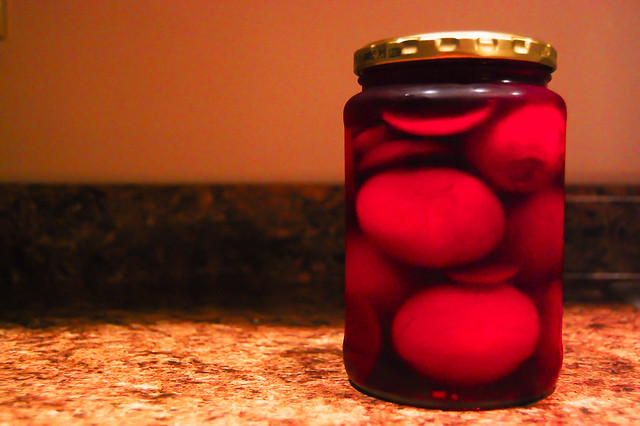Were there pickled eggs on your Easter table today? There's a reason. Check out the column I wrote for the Charleston Gazette-Mail.
Of all the symbols of Easter, it’s the humble egg that goes hand in hand with the festivities of the day: chocolate and peanut butter eggs from the local church, pastel-dyed hardboiled eggs that decorate the table, and, especially for those of us in Appalachia, homemade pickled eggs.
For the uninitiated, pickled eggs are hardboiled and cured in vinegar or brine that often includes beets, leaving the eggs a bright pink/purple color fit for the Easter dinner table. And they’re an Easter tradition in many West Virginia homes.
Will there pickled eggs and beets on your table this weekend?
If you’re like some of my friends, the chances are pretty likely you answered “yes.” Because when asked, I received responses like:
“We have pickle beets and eggs every year at my house.”
“If we don’t have pickled eggs, Easter is canceled.”
“My grandmother always does pickled eggs and beets for Easter.”
“Agree on this. Always available. Rarely touched. My dad is about the only one who eats them.”
“We always do this too, and I love them. [Purple] egg dying for grownups, basically!”
“I hate the pickled beets and eggs, but they’re definitely a tradition.”
According to the Oxford Encyclopedia of Food and Drink in America, red-beet pickled eggs have roots in Pennsylvania Dutch cooking brought over from Europe, and early farmers in Appalachia took to them as a way to preserve foods that could be eaten months later.
Pickling — and canning — were essential parts of a rural lifestyle, and pickled eggs have been a staple in Appalachian pantries since the 19th century.
One of the first documented mentions of pickled eggs in America appeared in “The Kentucky Housewife” in 1839. There, Lettice Bryan shared a recipe that included nutmeg and cloves, and even suggested cutting them into ringlets.
The Nelson household is not quite “ringlet-fancy,” but my dad does indeed whip up a pretty mean pickled egg that can be found not just during Easter, but often year-round.
As a child, I remember being enamored with the purplish-pink color the eggs would turn, and fishing either a pickled egg or a whole beet out of a glass jar (often one that served a previous life as a pickle jar) to nosh. Fingers stained purple, I would be pleased with catching either the beet or the egg, as long as it would turn my tongue a dark purple hue.
The tradition of eating pickled eggs — or any eggs — after Easter, according to The Catholic Encyclopedia, began because they were forbidden during Lent. So, they were one of the first treats eaten to celebrate the end of Lent.
Love them or hate them, pickled eggs are the bright centerpiece that completes many a West Virginia Easter dinner table. Nestled between the ham and maybe the Easter bread (if you have Italian ancestry), it is a true mainstay of the holiday.
I hope that by now you’ve broken out your purple dye (beet juice) and hardboiled eggs, and that you’ve partaken in some egg-dying for adults to carry on our Appalachian tradition during this holiday season. If not, hop to it. The Nelson family recipe can guide your way to fuschia fingers. Happy Easter.
Candace Nelson is a marketing and public relations professional living in Morgantown, W.Va. In her free time, Nelson blogs about West Virginia food culture at CandaceLately.com. Find her on Twitter at @Candace07 or email Candace127@gmail.com.
Frank Nelson’s pickled eggs
Ingredients:
2 15 oz. cans of beets
12 large eggs
1 cup sugar
1 cup vinegar
1 cup water
1 tbsp salt
1 tbsp garlic (diced)
1 tsp pepper
1 medium onion (diced)
3-4 stalks celery (diced)
Directions:
Put the dozen eggs in a pot, cover with cold water about an inch above the tops of the eggs and heat until boiling. Once the water begins to boil, remove the pot from heat and cover for 10-12 minutes. Then, run the eggs under cold water, peel them and add them to a large jar or bowl.
Cover he eggs with 1 can of beet juice along with the beets and set aside.
Combine the sugar, vinegar, water, salt, pepper, onion and celery in a large saucepan and bring to a boil.
Reduce the heat, cover and simmer for 12 minutes.
Add garlic at the last remaining minute.
Pour mixture over eggs, let sit overnight.
Enjoy the next day!
Of all the symbols of Easter, it’s the humble egg that goes hand in hand with the festivities of the day: chocolate and peanut butter eggs from the local church, pastel-dyed hardboiled eggs that decorate the table, and, especially for those of us in Appalachia, homemade pickled eggs.
For the uninitiated, pickled eggs are hardboiled and cured in vinegar or brine that often includes beets, leaving the eggs a bright pink/purple color fit for the Easter dinner table. And they’re an Easter tradition in many West Virginia homes.
Will there pickled eggs and beets on your table this weekend?
If you’re like some of my friends, the chances are pretty likely you answered “yes.” Because when asked, I received responses like:
“We have pickle beets and eggs every year at my house.”
“If we don’t have pickled eggs, Easter is canceled.”
“My grandmother always does pickled eggs and beets for Easter.”
“Agree on this. Always available. Rarely touched. My dad is about the only one who eats them.”
“We always do this too, and I love them. [Purple] egg dying for grownups, basically!”
“I hate the pickled beets and eggs, but they’re definitely a tradition.”
According to the Oxford Encyclopedia of Food and Drink in America, red-beet pickled eggs have roots in Pennsylvania Dutch cooking brought over from Europe, and early farmers in Appalachia took to them as a way to preserve foods that could be eaten months later.
Pickling — and canning — were essential parts of a rural lifestyle, and pickled eggs have been a staple in Appalachian pantries since the 19th century.
One of the first documented mentions of pickled eggs in America appeared in “The Kentucky Housewife” in 1839. There, Lettice Bryan shared a recipe that included nutmeg and cloves, and even suggested cutting them into ringlets.
The Nelson household is not quite “ringlet-fancy,” but my dad does indeed whip up a pretty mean pickled egg that can be found not just during Easter, but often year-round.
As a child, I remember being enamored with the purplish-pink color the eggs would turn, and fishing either a pickled egg or a whole beet out of a glass jar (often one that served a previous life as a pickle jar) to nosh. Fingers stained purple, I would be pleased with catching either the beet or the egg, as long as it would turn my tongue a dark purple hue.
The tradition of eating pickled eggs — or any eggs — after Easter, according to The Catholic Encyclopedia, began because they were forbidden during Lent. So, they were one of the first treats eaten to celebrate the end of Lent.
Love them or hate them, pickled eggs are the bright centerpiece that completes many a West Virginia Easter dinner table. Nestled between the ham and maybe the Easter bread (if you have Italian ancestry), it is a true mainstay of the holiday.
I hope that by now you’ve broken out your purple dye (beet juice) and hardboiled eggs, and that you’ve partaken in some egg-dying for adults to carry on our Appalachian tradition during this holiday season. If not, hop to it. The Nelson family recipe can guide your way to fuschia fingers. Happy Easter.
Candace Nelson is a marketing and public relations professional living in Morgantown, W.Va. In her free time, Nelson blogs about West Virginia food culture at CandaceLately.com. Find her on Twitter at @Candace07 or email Candace127@gmail.com.
Frank Nelson’s pickled eggs
Ingredients:
2 15 oz. cans of beets
12 large eggs
1 cup sugar
1 cup vinegar
1 cup water
1 tbsp salt
1 tbsp garlic (diced)
1 tsp pepper
1 medium onion (diced)
3-4 stalks celery (diced)
Directions:
Put the dozen eggs in a pot, cover with cold water about an inch above the tops of the eggs and heat until boiling. Once the water begins to boil, remove the pot from heat and cover for 10-12 minutes. Then, run the eggs under cold water, peel them and add them to a large jar or bowl.
Cover he eggs with 1 can of beet juice along with the beets and set aside.
Combine the sugar, vinegar, water, salt, pepper, onion and celery in a large saucepan and bring to a boil.
Reduce the heat, cover and simmer for 12 minutes.
Add garlic at the last remaining minute.
Pour mixture over eggs, let sit overnight.
Enjoy the next day!



0 comments